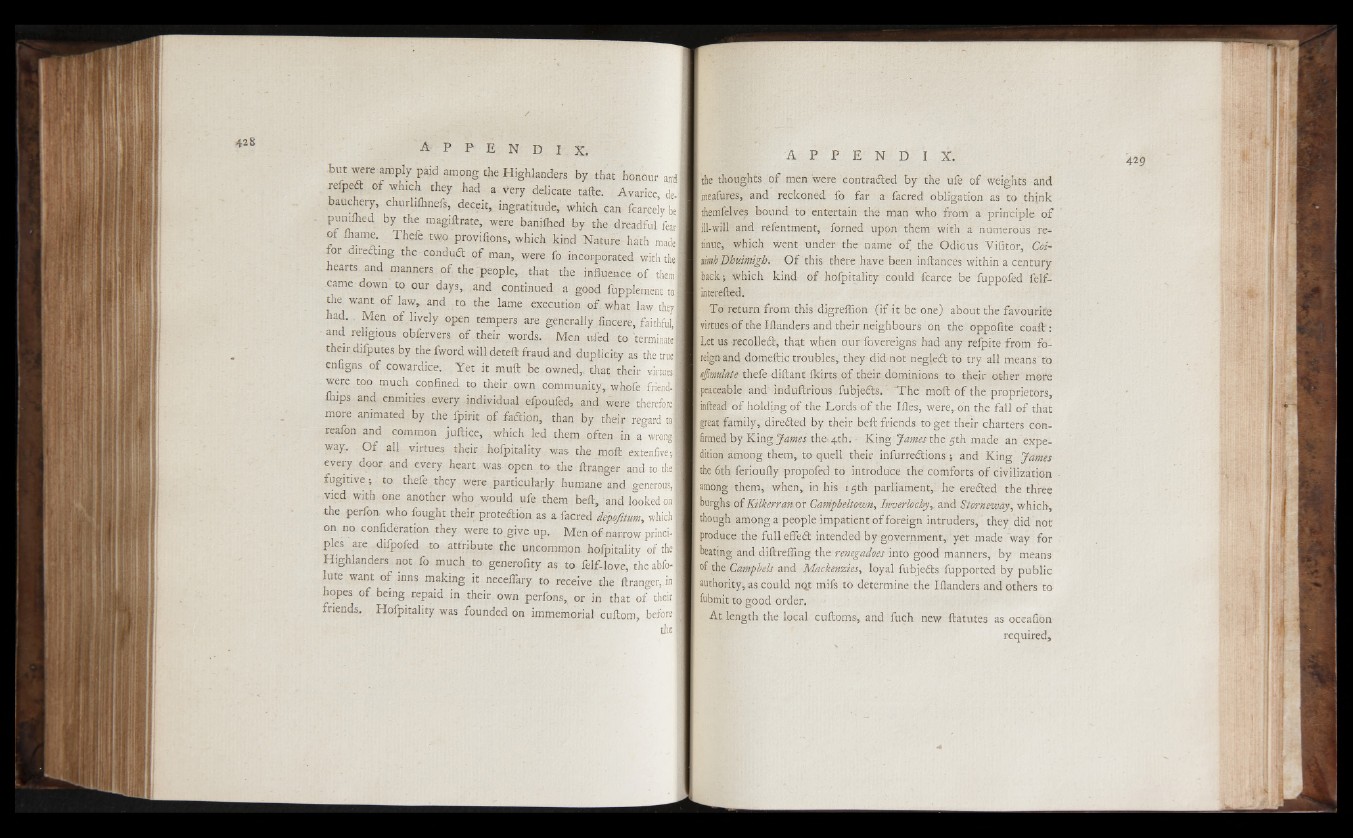
but were amply paid among the Highlanders by that honour airdl
refpedt of which they had a very delicate tafte. Avarice de-1
bauchery, churlilhnefs, deceit, ingratitude, which can fcarcelybel
' PunifHed by the magiftrate, were baniihed by the dreadful fear I
of ihame. Thefe two provifions, which kind Nature hath made!
or -diiedting the conduit of man, were fo incorporated with the]
hearts, and manners of the people, that the influence of them I
came down to our days, and continued a good fupplement to]
the want of law, and to the lame execution of what Jaw they!
had. Men of lively open tempers are generally fincere, faithful,!
and religious obfervers of their words. Men ufed to terminate!
their diiputes by the fword w-ill deteft fraud and duplicity as the true!
enfigns of cowardice. Yet it muft be owned, that their virtues!
were too much confined to their own community, whofe friend- i!
fliips and enmities every individual efpoufed, and were therefore!
more animated by the fpirit of fadtion, than by their regard tojj
reafon and common juftice, which led them often in a wrong!
way. Of all virtues their hofpitality was the molt extenfive J
every door and every heart was- open to the ■ Arranger and to the!
fugitive; to thefe they were particularly humane and generous, $
vied with one another who would ufe them belt, and looked on|
the perfon who fought their protection as a facred depofitum, which |
on no confederation they were to give up. Men of narrow princi-1
pies are difpofed to attribute the uncommon, hofpitality of the I
Highlanders not fo much to generofity as to felf-love, theabfo-J
lute want of inns making it necefiury to receive the ftranger, ini
hopes of being repaid in their own perfons, or in that of their I
friends, Hofpitality was founded on immemorial cuftom, before I
the I
the thoughts of men were contracted by the ufe of weights and
meafures, and reckoned fo far a facred obligation as to think
themfelves bound to entertain the man who from a principle of
ill-will and refentment, forned upon them with a numerous retinue,
which went under the name of the Odicus Yifitor, Coi-
nhDhuimigh. Of this there have been inftances within a century
back; which kind of hofpitality could fcarce be fuppofed felf-
interefted.
To return from this digreffion. (if it be one) about the favourite
virtues of the Iflanders and their neighbours on the oppofite coaft’ :
Let us recoiled!, that when our fovereigns had any refpite from foreign
and domeftic troubles, they did not negledl. to try all means to
¡Simulate thefe diftant ikirts of their dominions to their other more
peaceable and induftrious fubjedt-s. The moil of the proprietors,
inilead of holding of the Lords of the Iiles, were, on the fall of that
great family, diredted by their beft friends to get their charters confirmed
by King James the* 4th. - King James the 5th made an expedition
among them, to quell their infurredtions ; and King James
the 6th ferioufly propofed to introduce the comforts of civilization
among them, when, in his 15th parliament, he eredted the three
burghs of Iiilkerran.or Campbeltown, Inverlochy,. and Storneway, which,
though among a people impatient of foreign intruders, they did not
produce the fulleffedt intended by government,' yet made way for
beating and diftrefiing the renegadoes into good manners, by means
of the Campbels and Mackenzies, loyal fubjedts fupported by public
authority, as could nqt mifs to determine the Iflanders and others to
fubmit to good order.
At length the local cuitoms, and fuch new ftatutes as oceafion
required,